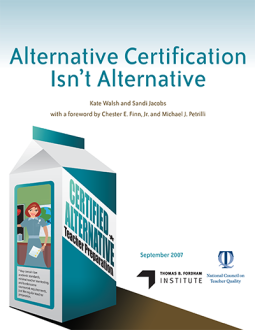At first glance, the explosive growth of "alternative" teacher certification--which is supposed to allow able individuals to teach in public schools without first passing through a college of education--appears to be one of the great success stories of modern education reform. From negligible numbers twenty years ago, alternatively prepared candidates now account for almost one in five new teachers nationwide. That's a "market share" of nearly 20 percent. As longtime supporters of alternative certification, we should be popping champagne, declaring victory, and plotting our next big win, right? Not so fast. As the old cliché says, if it looks too good to be true, it probably is.
"Alternative Certification Isn't Alternative" reveals that alternative certification programs, contrary to their original mission, have not provided a real alternative to traditional education schools. In fact, they represent a significant setback for education reform advocates.
Here are the report's main points:
- Entry standards are abysmally low: Two-thirds of the programs surveyed accept half or more of their teacher applicants; one-quarter accept virtually everyone who applies.
- Rather than providing streamlined and effective coursework, about a third of the programs require at least 30 hours of education school courses-the same amount needed for a Master's degree.
- Most disturbing, nearly 70 percent of alternative programs studied in the report are run by education schools themselves. Education schools have kept their market monopoly by moving into the alternative certification business.
In short, policymakers, reform advocates, and philanthropists who think they have "won" the battle in favor of alternative certification should think again. Twenty-five years later, concerns about the quality of education schools remain--as does the need for bona fide alternatives: swifter, better, surer, cheaper ways to address teaching aspirations on the one hand and workforce quality and quantity problems on the other. So put away the champagne. Much heavy lifting lies ahead.




